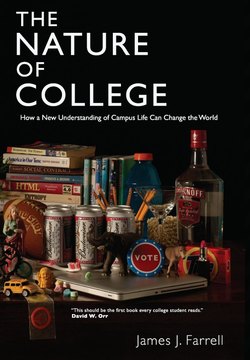Читать книгу The Nature of College - James J. Farrell - Страница 25
На сайте Литреса книга снята с продажи.
Mirror Image: The Nature of Looking Good
ОглавлениеAfter performing their cleansing rituals, Joe and Jo College usually take part in rituals of self-inspection and self-improvement in front of a mirror. The word “mirror” itself comes from the Latin root mirari—to admire—making a mirror, at its root, a meeting place for a mutual admiration society of one.
Yet while its smooth surface simply reflects the images of objects, a mirror also performs cultural work, reflecting the patterns of American society. It is a visual echo, and, like television, a way of seeing—and not seeing.
As a matter of physics, most mirrors reflect exactly the patterns of light and shade that hit them. But as a matter of culture, there can be significant distortions, because mirrors reflect not just the way we are but also the ways we hope (or fear) to be. For example, when we look at a mirror in the morning, we are trained by years of advice and advertising to see not just our own reflection, but also its relationship to ideal images in magazines or on TV. We are trained to focus on particulars: We don’t usually see the whole picture because we’re concentrating on so-called problem areas that popular culture has pinpointed for us. One student’s mirror highlights his pimples and the size of his nose, while another’s magnifies her worry about her makeup and hair. Mirrors permit us to objectify ourselves, to look at ourselves as others see us, rather than as we truly are. American culture teaches us to be attractive, and to dress for success, and the mirror provides the final exam to see if we have succeeded.
But mirrors can’t do everything. Although they reveal the social self, they divert our attention from the natural self. Contemplating teeth, zits, facial hair, and the dark circles under our eyes, we forget to appreciate the intricacy of the organism that stands before us. We forget, for example, the marvel of our eyes, which allow us to use a mirror effectively. An immense evolutionary advantage, they provided our ancestors with the hand-eye coordination that has made Homo sapiens such a successful species. Containing about half the sensory receptors in the body, our eyes use about 30 percent of the brain’s cortex to see that bleary face in the mirror. But we don’t usually perceive the amazing ecological adaptation staring back at us. Eyeing the mirror to check out the surfaces of the self, we miss the nature of the body and the nature of its connections to the rest of nature. Although he wasn’t talking about mirrors, Thoreau once wrote that he wanted to be “nature looking into nature.” That’s what happens in mirrors of America. But because we bring our cultural preoccupations to the mirror, we often turn out to be nature looking away from nature.21
